Related Research Articles
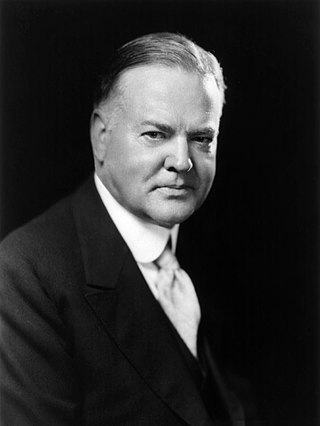
Herbert Clark Hoover was an American politician who served as the 31st president of the United States from 1929 to 1933. A member of the Republican Party, he held office during the onset of the Great Depression. A self-made man who became wealthy as a mining engineer, before his presidency, Hoover led the war-time Commission for Relief in Belgium, served as the director of the U.S. Food Administration, and served as the U.S. secretary of commerce.

Thomas Woodrow Wilson was an American politician and academic who served as the 28th president of the United States from 1913 to 1921. A member of the Democratic Party, Wilson served as the president of Princeton University and as the governor of New Jersey before winning the 1912 presidential election. As president, Wilson changed the nation's economic policies and led the United States into World War I in 1917. He was the leading architect of the League of Nations, and his progressive stance on foreign policy came to be known as Wilsonianism.

Jeannette Pickering Rankin was an American politician and women's rights advocate who became the first woman to hold federal office in the United States. She was elected to the U.S. House of Representatives as a Republican from Montana in 1916 for one term, then was elected again in 1940. Rankin remains the only woman ever elected to Congress from Montana.

The Princeton School of Public and International Affairs is a professional public policy school at Princeton University. The school provides an array of comprehensive coursework in the fields of international development, foreign policy, science and technology, and economics and finance through its undergraduate (AB) degrees, graduate Master of Public Affairs (MPA), Master of Public Policy (MPP), and PhD degrees.

Stephen Anthony Cambone was the first United States Under Secretary of Defense for Intelligence, a post created in March 2003. Cambone first came to the attention of the public at large during the testimony of Major General Antonio Taguba before the U.S. Senate Armed Services Committee, where he disputed the General's statement that prison guards were under the effective control of military intelligence personnel and interrogators. Cambone resigned at the beginning of 2007 and was replaced by James R. Clapper, Jr., former head of the Defense Intelligence Agency (DIA) and the National Geospatial-Intelligence Agency. Cambone was associated with the Project for the New American Century, participating in the study which resulted in the writing of the report Rebuilding America's Defenses.
Patricia Ireland is an American administrator and feminist. She served as president of the National Organization for Women from 1991 to 2001 and published an autobiography, What Women Want, in 1996.

Blanche Wiesen Cook is a historian and professor of history. She is a recipient of the Bill Whitehead Award.

The Hall of Fame for Great Americans is an outdoor sculpture gallery located on the grounds of Bronx Community College (BCC) in the Bronx, New York City. It was the first such hall of fame in the United States. Built in 1901 as part of the University Heights campus of New York University (NYU), the structure was designed by architect Stanford White to conceal a retaining wall for the Gould Memorial Library. The hall commemorates 102 prominent Americans, selected by a board of electors and grouped into one of fifteen categories. The physical structure consists of a loggia with colonnades measuring 630 feet (190 m) long. The colonnades contain niches with plaques and 96 bronze portrait busts.

Wilsonianism, or Wilsonian idealism, is a certain type of foreign policy advice. The term comes from the ideas and proposals of President Woodrow Wilson. He issued his famous Fourteen Points in January 1918 as a basis for ending World War I and promoting world peace. He was a leading advocate of the League of Nations to enable the international community to avoid wars and end hostile aggression. Wilsonianism is a form of liberal internationalism.
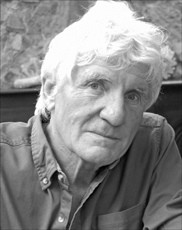
Anthony Bruce Summers is an Irish author. He is a Pulitzer Prize Finalist and has written ten non-fiction books. He worked for the BBC in current affairs coverage as a producer and then as an assistant editor of the long-running investigative documentary series Panorama. His first book was published in 1976.
The Rocky Mountain Club was incorporated in New York City as an "Eastern Home of Western Men" with the purpose to "create good-fellowship among the members and advance the interests of the Rock Mountain States." John Hays Hammond was the only president. The original directors were: W. B. Thompson, A. J. Seligman, John Campbell Cory, B. B. Taylor, Frederick Russell Burnham and J. J. McEvelly. Theodore Roosevelt was a prominent member, along with U.S. Senator Thomas Kearns of Utah and U.S. Senator W.A. Clark of Montana.
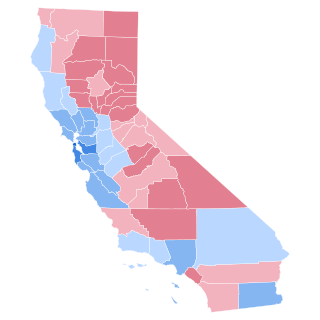
The 1996 United States presidential election in California took place on November 5, 1996, as part of the 1996 United States presidential election. Voters chose 54 representatives, or electors to the Electoral College, who voted for president and vice president. California, was won by Incumbent President Bill Clinton (D) over Senator Bob Dole (R), with Clinton winning 51.1% to 38.21% by a margin of 12.89%. Billionaire businessman Ross Perot finished in third, with 6.96% of the popular vote.
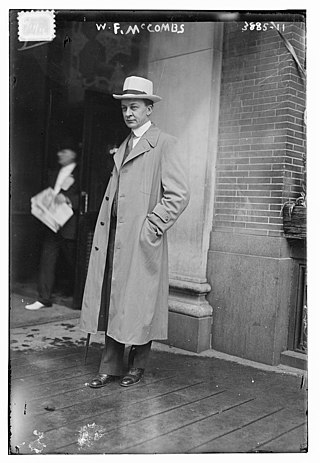
William Frank McCombs was an American lawyer and politician who served as chair of the Democratic National Committee from 1912 to 1916.
Joan Kelly, also known as Joan Kelly-Gadol was a prominent American historian who wrote on the Italian Renaissance, specifically on Leon Battista Alberti. Among her best known works is the essay "Did Women Have a Renaissance?" which was first published in 1976. The article challenged the contemporary historiography of the Renaissance, arguing that women's power and agency declined during the early modern period.

The 1920 United States elections was held on November 2. In the aftermath of World War I, the Republican Party re-established the dominant position it lost in the 1910 and 1912 elections. This was the first election after the ratification of the 19th Amendment, which granted women the constitutional right to vote.

Elizabeth Cobbs is an American historian, commentator and author of nine books including three novels, a history textbook and five non-fiction works. She retired from Melbern G. Glasscock Chair in American History at Texas A&M University (2015-2023), following upon a four-decade career in California where she began working for the Center for Women’s Studies and Services as a teenager. She writes on the subjects of feminism and human rights, and the history of U.S. foreign relations. She is known for advancing the controversial theory that the United States is not an empire, challenging a common scholarly assumption. She asserts instead that the federal government has played the role of “umpire” at home and abroad since 1776.

The United Mine Workers coal strike of 1919 saw bituminous coal miners strike for over a month, from November 1 to December 10, 1919, for better wages.
Breaking the Heart of the World: Woodrow Wilson and the Fight for the League of Nations is a 2001 book by the historian John M. Cooper about Woodrow Wilson and his advocacy for the League of Nations. It was published by Cambridge University Press.
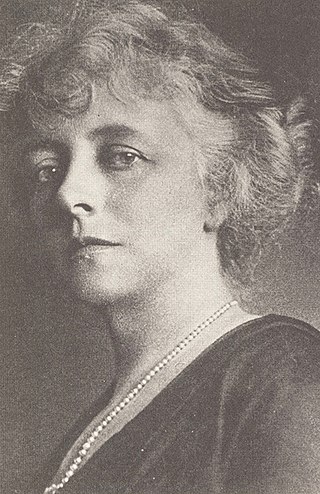
Mary Wilson Thompson was a Delaware civic leader. As leader of the Delaware Association Opposed to Woman Suffrage, she is credited with the Delaware General Assembly's failure to ratify the 19th Amendment, which granted women the right to vote in the United States.
Kim E. Nielsen is an American historian and author who specializes in disability studies. Since 2012, Nielsen has been a professor of history, disability studies, and women's studies at the University of Toledo. Nielsen originally trained as historian of women and politics, and came to disability history and studies via her discovery of Helen Keller's political life.
References
- 1 2 3 4 5 6 Herbert Hoover Reassessed: Essays Commemorating the Fiftieth Anniversary of the Inauguration of Our Thirty-first President. U.S. Government Printing Office. 1981. p. 119.
- 1 2 Schulz, Constance B.; Turner, Elizabeth Hayes (2004). Clio's Southern Sisters: Interviews with Leaders of the Southern Association for Women Historians. University of Missouri Press. p. 275. ISBN 978-0-8262-6428-2.
- 1 2 "Hoff, Joan, 1937-". LC Name Authority File (LCNAF). The Library of Congress. Retrieved 2022-10-11.
- 1 2 Welsh, James Michael; Whaley, Donald M. (2013). "Joan Hoff". The Oliver Stone Encyclopedia. Rowman & Littlefield. p. 110. ISBN 978-0-8108-8352-9.
- 1 2 3 "From Butte to PBS: Noted historian keeps hand in history as an MSU adjunct". Montana State University.
- ↑ Charlton, Linda (1981-06-21). "Women's History Meeting Analyzes Trends". The New York Times. ISSN 0362-4331 . Retrieved 2022-10-11.
- 1 2 "Hoff, Joan". Encyclopedia.com. Retrieved 2022-10-11.
- 1 2 3 4 5 "Joan Hoff: University Honors and Awards". Indiana University, University Honors & Awards.
- ↑ Schmidt, Carol (December 2, 2003). "From Butte to PBS: Noted historian keeps hand in history as an MSU adjunct". Montana State University. Retrieved 2022-10-11.
- 1 2 CGWH Newsletter, Issue 2. Vol. 6. Conference Group on Women's History. 1981. p. 8.
- ↑ Kent, Susan (March 1, 1996). "Mistrials and diatribulations: a reply to Joan Hoff". Women's History Review. 5 (1): 9–18. doi: 10.1080/09612029600200110 .
- ↑ "Joan Hoff | C-SPAN.org". www.c-span.org.
- ↑ Radosh, Ronald (1975-08-17). "Herbert Hoover". The New York Times. ISSN 0362-4331 . Retrieved 2022-10-11.
- ↑ "Nixon Reconsidered, Joan Hoff. Basic Books, $30 (496pp) ISBN 978-0-465-05107-6". publishersweekly.com. July 4, 1994. Retrieved 2022-10-11.
- ↑ Smith, Richard Norton (1994-10-30). "The Nixon Watch Continues". The New York Times. ISSN 0362-4331 . Retrieved 2022-10-11.
- ↑ Kafara, Rylan (October 8, 2010). "Joan Hoff, A Faustian Foreign Policy from Woodrow Wilson to George W. Bush: Dreams of Perfectibility (New York: Cambridge University Press, 2008)". Past Imperfect. 16. doi: 10.21971/P7H88R – via journals.library.ualberta.ca.
- ↑ "The Cooper's Wife Is Missing: The Trials of Bridget Cleary, Joan Hoff. Basic Books, $26 (458pp) ISBN 978-0-465-03087-3". publishersweekly.com. Retrieved 2022-10-11.
- ↑ McCullough, David Willis (2000-10-08). "The Fairy Defense". The New York Times. ISSN 0362-4331 . Retrieved 2022-10-11.